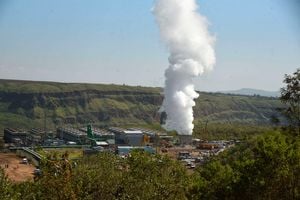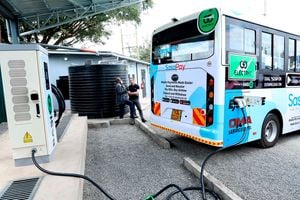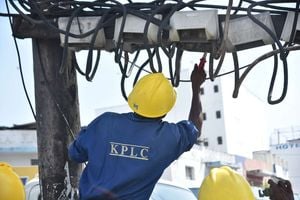
Thousands of Kenya Power customers, both domestic and commercial, are switching to solar energy.
Bamburi Cement has become the latest company in a long list of industrial power consumers that are opting to produce their own electricity to reduce costs.
Last week, the cement-maker said it will save about Sh400 million annually upon completion of its two solar plants in Nairobi and Mombasa.
The firm is setting up a 14.5 megawatts (MW) solar plant in Mombasa and a five megawatts plant at the Nairobi factory through which it hopes to meet about 30 percent of its annual power needs.
The company in late early 2022 signed a power purchase agreement (PPA) with MOMNAI Energy Limited to set up the two solar plants adjacent to its Mombasa and Nairobi factories.
“It is a PPA, meaning we do not need to put in any investment and we will be getting about Sh400 million savings every year on power,” said Ms Jane Wangari, the sustainability director at the firm.
The company, which is listed at the Nairobi Securities Exchange (NSE), is not alone. Thousands of customers, both domestic and commercial, are switching to solar energy.
Many would-be Kenya Power customers who want to be connected to the grid have been put off by the steep quotations.
Some customers have received quotations of as much as Sh3 million. It is for this reason that hundreds of firms are trooping to the offices of the Energy and Petroleum Regulatory Authority (Epra) to seek licences to be allowed to generate power for their own use.
Any individual or company that wants to generate power of more than 1 megawatt (MW) has to seek Epra’s approval, according to the Energy Act of 2019. Epra says that, by June 2023, it had licensed companies to generate 402.3MW of power.
For context, this is nearly 11 percent of the total capacity that all the commercial power plants such as KenGen and independent power producers (IPPs) have. Of this, 154.9MW are solar systems, 105.9MW are biomass plants, 33MW hydro, 21.3MW thermal, 3.7MW geothermal and 83.5MW waste heat recovery systems.
A 55MW Devki Steel Mills waste heat recovery plant based in Kwale County is the largest captive generation plant in Kenya.
The long list of companies that have installed or a planning to generate their own electricity includes Devyani Food Industries, the manufacturer of Daima Milk, which in October last year made an application to Epra to set up a 1,000kWp solar PV plant at Salgaa in Nakuru.
Others are Cemtech Limited, which is a subsidiary of Devki Group, Two Rivers Power Company (TRPC), Unilever Tea Kenya, Total Energies Kenya, Maisha Mabati Mills, Africa Logistics Properties (ALP), American Tower Corporation (ATC) Kenya, and Abyssinia Iron and Steel Limited.
The trend has set alarm bells ringing at Kenya Power, which sold 5,153 gigawatt-hours (GWh) of electricity to large commercial and industrial customers in the year to June 2023. This is 53.8 percent of the firm’s sales of 9,567GWh during the period.
It has also not gone unnoticed by policy makers in the government, leading to fresh attempts to slow down this shift.
The most recent is an amendment contained in the Statute Law (Miscellaneous Amendments) Bill, 2023. It proposes to amend the Energy Act of 2019 to mandate consumers to seek approval from Epra if they want to generate power of more than 500kW (kilowatts).
Currently, only those seeking to generate more than 1MW are required to get Epra’s approval.
This would essentially make anyone seeking to set up even power systems of the relatively small capacity of 500kW go through stringent regulatory processes to get approval.












